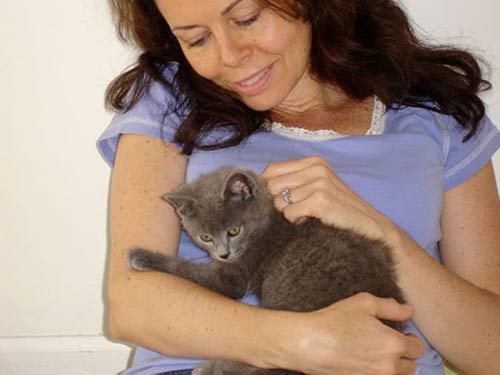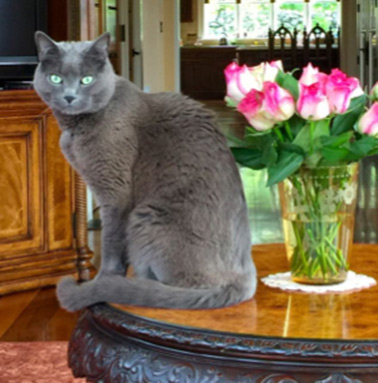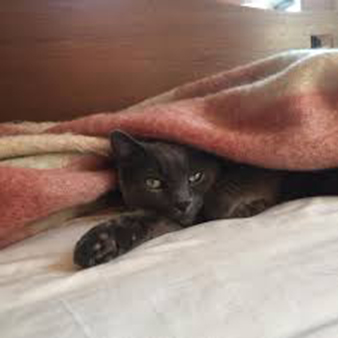The Risk of Love
Poupon was an almost constant source of connectedness and entertainment for Cheryl and her husband Michael. One night he snuck into their dining room and carried off a pizza box. He was gently busted as he slunk off his kill to his private lair. In the evenings he’d creep up onto their shoulders and knead their muscles before settling into the crook of an arm and then stretch out like a child to watch TV with them.
I met Cheryl Richardson when she spoke at a writers conference in Boston. Over the next year I also came to know Poupon, Grey Poupon, that is. I learned that his love for her and Michael brought them close. The Nichol family pets are that way. They break things, dig holes and make noise but they love us always.
I’ve never physically touched Poupon, never palpated his abdomen, or listened to his chest but his people have shared enough photos and videos that seeing the softness in their expressions, well, I feel a kinship. Pets don’t speak a human language, so we can believe whatever we want about their thoughts and emotions and they never argue.
A couple of years ago Michael noticed that 10 year old Poupon was sleeping more, becoming lethargic and easily fatigued. Cheryl did her best to ignore these warning signs. Denial is understandable. We do this because we can’t bear the thought of a serious diagnosis. Good sense ultimately prevailed and a house call veterinarian was summoned. Poupon’s elevated liver enzymes indicated trouble but after conservative treatment failed, a follow-up exam revealed internal masses.
Abdominal x-rays and ultrasound brought reality crashing home. Cheryl and Michael would have done anything to save Poupon but his cancer was inoperable. Chemotherapy could buy him a few months but his history of intense distress in the veterinary hospital ruled this option out.
It took Poupon’s people a couple of weeks to find their way. Their kitty’s wellbeing mattered most but they struggled with sadness. My part, from across the country, was to listen and offer support and medical advice.
Weathering the storm
Cheryl contacted me as soon as she and Michael were hit by the first wave of bad news. I learned long ago that what people in this fragile state need most is a brief sympathetic remark like, “Oh, gee”. What they don’t need is assurances that life will go on, platitudes like, “it’s better to have loved and lost”, or even, “tell me how you’re feeling”. They need us to shut up and listen – with kindness and empathy. My job was to support these folks as the bottom fell out of their life with Poupon, the pet who’d brought them so much joy and love.
Cheryl and Michael tried desperately to understand the cancer that was stealing Poupon from them. They wanted to comprehend this unimaginable disaster. They also knew that they had to plan for the inevitable. How, where, and when was it best to but their beloved cat to rest? Bury him or have him cremated? We talked about all of it plus how their lives would change after Poupon was gone.
I explained their options and listened to Cheryl’s escalating sadness. Remembering that difficult time she has said, “After two weeks of exams and tests we made the heartbreaking decision to put Poupon to rest. We realized it was the most loving thing we could do – before he started to really suffer.” She and Michael had the courage to briefly set aside their own emotions so they could shortcut their special pet’s impending misery.
Poupon’s fear of veterinary clinics started years previously. Restraining him for a blood draw an assistant had unintentionally scared him badly. Like all cats, he was a master of “one event learning”. No way was he going near a doctor’s office again. Euthanasia would happen at home, where it’s often best done anyway. But how could Poupon’s final moments be free of fear?
People are well-meaning. A whole lot of friends weighed-in with advice. Many urged Cheryl to replace Poupon ASAP. Good idea? Is anybody every truly replaceable?
Sadness on the path to healing
Life is precious, especially those shared with joy and acceptance. As Cheryl sat on her deck to meditate, Poupon waited at the door – every day. A robust lifelong family member, he followed his person everywhere. His constant presence made home better. All of us know our pets’ lives will end someday but who is ever really prepared? Cheryl and Michael weren’t.
In my long career I’ve encountered nearly every disorder known to veterinary medicine. Like all of my colleagues I’ve accomplished a few saves. I’ve also learned some humbling lessons along the way. Here’s one: We are all temporary.
I sent Cheryl a sedative gel to apply to Poupon’s gums prior to the arrival of the house call veterinarian. The family conducted a personal ritual and held their cat close as they whispered their goodbyes. It was a peaceful passing.
Cheryl recalled her feelings from that hard time she and Michael endured 2 years ago. “We’re devastated – it’s our first adult pet loss together. I search the house for pieces of Poupon for two weeks – nail clippings, whiskers, etc. I keep his litter box for two weeks because of a footprint. Slowly, we move some of his stuff out of the house. My assistant takes some things to hold onto because she’s wise enough to know I might want them again someday (and I did). We start the painful process of grieving.”
It’s possible to get stuck in a quagmire of sadness but Cheryl and Michael have grown beyond the emotional wreckage of losing their special cat. Talking through the pain is necessary but you can’t do this with just anyone. Other committed pet parents are safe. Poupon’s people can now look back and laugh at their good boy’s antics. They’ve survived this journey so well that I know their cat is proud, wherever his little spirit -with its unconditional love and commitment – lives on.
How to Know When to Adopt Again
Inviting a pet into your life carries risk. They love us completely and they’ll never leave but when their lives end the grief can drag you down a dark hole. You desperately need kindness and support but it can be hard to find. Friends and even family might wonder, some of them aloud, “Hey, it’s just an animal. Get over it.” We can’t change them. They’ve never felt that connection. But there are those who do get it.
Looking back, Cheryl wishes she had talked to people who understood about pet loss, rather than keeping her pain to herself. She avoided sharing a lot of it with Michael because he was in pain too. That’s when she started helping others who had written to her. It helped her to know she wasn’t alone.
A year after their cat’s death they buried some of his ashes. Two years later they started talking about adoption. Poupon’s personality had fit their lives like a glove. He’d been perfect for them. Cheryl and Michael would keep his memory alive and, of course, they knew they’d never find anybody just like him. They’d have to choose their next kitten carefully. Love at first sight is a crap shoot, not the best strategy for picking a life partner. There is a better way.
I’ve made videos, posted on You Tube, called “Choosing the Greatest Kitten for Your Life” and “Choosing the Greatest Puppy for Your Life”. The methods I demonstrate are based on research, intended to help people find that special baby who can become the best friend possible. Still, there are no guarantees.
I explained Cheryl how adopting littermates can work well for everybody. Michael wanted only one kitten; she had her heart set on two. A good husband knows how to compromise. And so they adopted Wednesday and Pubert, into their forever home.
Cheryl Richardson is a bestselling author, speaker, and teacher on the subject of self-care. Purchase her new audio book called “How to Survive the Loss of a Pet” on her website, cherylrichardson.com/books.





